- Home
- Richard K. Morgan
The Steel Remains lffh-1 Page 12
The Steel Remains lffh-1 Read online
Page 12
Ringil brooded. “The Majak believe that the band is a pathway leading to the Sky Home of the honorable dead. A ghost road.”
“Yes, but they’re savages.”
Ringil remembered Egar’s scarred and tattooed features, slightly surprised at the sudden flare of affection it triggered. It was how the steppe nomad would cheerfully have described himself—I ain’t fucking civilized, Gil, he’d said one campfire night on the march to Hanliahg. That’s not something I’m ever going to need—but still Shalak’s automatic sneer went home like a barb. He held down a spurt of unreasonably defensive anger.
“I don’t know,” he said carefully. “You spend any time that far north, you get to see some strange shit in the sky. You should get yourself up there sometime. And anyway, here we are talking about the Aldrain as ghost warriors. So you know, maybe there’s something in it.”
“Ringil, I really don’t think you can stack a bunch of shamanistic gibbering up against the gathered writings of the Kiriath’s finest minds and expect it to make a pile the same height.”
“All right. So you tell me—how did these finest minds among the Kiriath beat the Aldrain?”
Shalak shrugged. “With machinery, it seems. The way the Kiriath did most things. There are a lot of references to—”
Outside in the street, someone started shouting. Something thumped audibly against the wall. Shalak flinched, perhaps with the old memories, and went swiftly to one of the shop’s grimy windows. He peered out for a moment, then relaxed.
“It’s just Darby,” he said. “Another one of his episodes, looks like.”
“Darby?” Ringil got up and drifted toward the window, ducking the wind chimes. “What’s he, a neighbor of yours?”
“Thankfully not.” Shalak shifted slightly to give Ringil space at his side, and nodded at the scene on the other side of the glass. “Look.”
In the early-evening sunlight outside, the crowds had parted and drawn back, become a silhouetted whole, a curtain closing in a broad oval of cobbled street. In the center of this impromptu arena, a solitary figure stood isolated. His clothing was obviously ragged beneath a longish, dirty blue coat that looked somehow familiar, and he brandished some kind of crude cudgel in a two-handed ax grip. At his feet, a pair of elegantly attired forms rolled about on the cobbles, clutching at themselves where blows had obviously been delivered.
“Darby,” Shalak repeated, as if that were explanation enough.
“And the others?”
The shopkeeper pulled a face. “No idea. Clerks-at-law by their coats, they’re probably down from the courts at Lim Cross, sessions’ll be turning out about now. Darby doesn’t like lawyers much.”
That much was evident. Darby loomed over the two men he’d put on the ground, lips peeled back off his teeth, eyes staring. His hair was a tangled gray mess, visibly greasy from lack of washing, and he had a beard down to his chest to match. He was saying something to the men, but you couldn’t hear it through the window glass.
For all of that, the weapon in his hands was absolutely steady.
The sinking sun caught on an epaulet buckle, and inside Ringil’s krinzanz-tender head, familiarity leapt into recognition. He swore softly to himself.
And then the Watch arrived.
Six men strong, they forced their way through the curtaining crowd of spectators with shoulders and well-judged jolts from the ends of their day-clubs. Darby watched them come. They spilled out into the cleared space in a loose group, saw the cudgel, and maybe recognized the coat the way Ringil just had. They glanced back and forth at one another. The stunned men at Darby’s feet lay where they were, still prone, dazed in the flooding sunlight, half aware at best of what was going on. No one said anything. Then the watchmen began to spread out, sliding warily around the edge of the cleared space like coffee in the rim of a tipped saucer, skirting their target, looking to surround and overwhelm.
Darby saw it and grinned in his beard.
Ringil was already on his way out the door.
The first attacker came up on Darby from the rear, just off his left shoulder. It was an obvious move, not hard for him to anticipate. Those in front couldn’t, after all, conduct the fight across the living bodies of fallen worthy citizens. Plus, the long shadows cast on the cobbles telegraphed the attack. The watchman came in swinging his club down, and Darby wasn’t there anymore. He’d stepped back and aside, an odd, unlooked-for elegance in the move, almost like dance. The watchman was caught, arms up with the club, falling forward into his move. Darby swung hard, with the cudgel held horizontal, into the man’s unprotected belly and lower ribs. The impact sounded like an ax in wood. The watchman made a choked shriek.
The others rushed in as best they could.
Darby slid the cudgel clear like it was a sword, but it wasn’t. It was rough and blunt and the watchman’s weight was folded over it. In the moment the difference cost him, a second club wielder slammed him across the shoulders. It was a mistake—not trying for the head. Darby staggered and snarled, but he didn’t go down. The watchman tried to hook his feet out from under him and Darby stabbed backward with the cudgel, got the man in the face. Blood splashed in the sunlit air. Darby whooped at the sight of it, leapt the clerks’ bodies, and landed cat-like between two of the other watchmen before they could register what was happening. The cudgel whirled about him in a blur. The crowd swayed back with a fairground chorus of excited yells. The cudgel caught one of the Watch about the head and sent him staggering, but either it missed the other or the man was a cannier fighter than his fellows.
This much Ringil saw as he came through the door, this much he’d more or less assumed—the coat was its own prophecy of how the fight would go. But now the untouched watchman nearest to Darby waded in, club held in a two-handed sword grip, feinting and blocking, bellowing hoarse and low to those of his comrades still on their feet.
“Get in behind him! Bring this fuck down, will you!”
He was younger than Darby by a generation, and faster. He blocked Darby’s cudgel, looped it away, and got in a savage blow to the older man’s elbow. Darby howled obscenities, gave up no fucking inch of ground, swung back. Something in Ringil cheered at the sight. The young watchman skipped outside the swing, then rushed in with his club braced baton-style. He pinned Darby’s arm to his body, pinned the cudgel, and shoved him back a solid pace. A second watchman saw his chance and jumped in behind. He hooked his day-club over Darby’s head, took it back hard at the throat, and dragged his victim backward and down, a couple of yards away from where the two law clerks were finally sitting up and taking notice. Darby choked and thrashed and, finally, went to the ground over his attacker’s bent knee. The young watchman stepped up, dodging Darby’s flailing feet, and swung a long hard kick into the downed fighter’s groin. Darby squawked and convulsed.
The others closed in. The clubs rose and fell.
“That’s enough! He’s down.”
But now the Watch’s blood was up. The shout alone was never going to be enough and Ringil, clear in the knowledge, was moving forward even as the words left his lips. He reached up left-handed, grabbed a day-club as it came up, and yanked hard on it. The surprised watchman lost his grip and stumbled. Ringil got a grip on the man’s collar with his other hand, manhandled him impatiently out of the way. Then he waded in and used the commandeered club to break up the fun.
Jolt into belly, smash knuckles on an opposing club, tangle legs—block! shove! hurt! It was awhile since he’d fought with a stick—some village commons contest Jhesh had inveigled him into a few years back when Ringil’s finances were at low ebb and the storytelling wouldn’t cut it for his tab—but the dynamics never really went away. He’d trained extensively with mocked-up Majak staff lances in the Academy, before they let him loose on the real thing, and then there were Yhelteth empty-hand techniques that spilled out into a form using a simple bamboo pole . . . The watchmen were trained as well, of course, but not with much care, and this new attack was th
e last thing they’d looked for. It took Ringil a scant few seconds to drive them off the man on the ground, and then he had them repelled into a wary circle similar to the one they’d approached Darby with in the first place. Difference was, this time two of them were already down on the cobbles and out of it, courtesy of Darby’s earlier efforts, and the other four, nursing a host of minor injuries, did not know what to make of this newcomer, I mean, look, man: moss-soft cloak of blue that quite visibly would have cost them a year’s wages, clothes beneath of equally fine embroidered cloth, a sword on his back, a killing calm in his eyes, and the stolen day-club, held out one-handed and pointing as if it were a bladed weapon.
Ringil turned very slowly, marking each man along the shaft of the leveled club, daring them to come back at him.
“I think you made your arrest,” he said evenly. “Let’s call it a day, shall we?”
“You’re interfering with Watch business,” blustered the young, fast one who’d pinned Darby up in the fight. “That man’s a known public nuisance.”
“Maybe so.” Ringil sidestepped, eyes still on the circling watchmen, and prodded Darby’s prone form with his boot. Darby groaned. “But I don’t see him in a state to make much mischief now, do you?”
“He assaulted people. He’s got a history of it.”
“Well, we’re none of us historians here. Where are the injured parties?”
Unfortunately, the two law clerks hadn’t run off, they were still hiding in the crowd. Now they trod forward, clothes in disarray, faces flushed and bearing some small scrapes. Ringil spared them a glance.
“You got in a fight with this man?”
“He attacked us,” spluttered the more distressed looking of the two men. “Unprovoked. Started shoving us in the crowd, screaming abuse for no reason.”
“Lying fucks.” Slurring tones—at Ringil’s heel, Darby had managed to prop himself up on one arm. The motion brought with it a heady stink of unwashed flesh laced with piss and cheap wine. The man had clearly not bathed in a couple of months. “Called me an animal. A fucking marsh sloth. Not so long ago it was I fought to keep your mamas from being spitted on a big fucking lizard prick, that’s the thanks I get? I made my living with honest fucking steel, not robbing a man’s home and family with papers and ink.”
“I don’t know what he’s talking about,” said the other clerk, somewhat calmer than his companion. He seemed, perhaps with an eye sharpened by his profession, to have taken stock of Ringil’s attire. “But from the state of the man, I think it’s pretty clear who you can believe here.”
“That’s a skirmish ranger’s coat he’s wearing,” Ringil said, trying not to breathe through his nose. “Which suggests he was considered good enough to give his life for the city once. Perhaps there’s something in what he says.”
The clerk flushed. “Are you accusing me of lying, sir?”
“If you choose to take it that way.”
A slight, hanging silence. The crowd watched, lapping it up. The clerks looked uneasily at each other. Neither was armed beyond short ceremonial poniards they clearly had no idea how to use.
“Look,” one of them began.
Ringil shook his head. “You don’t look worse than shaken up, either of you. Nothing a visit to the baths won’t ease. In your place, I’d cut my losses and go home. Think of it as a valuable lesson in manners.”
He held their gaze for the time it took to make sure they’d do as he said. Watched them push through the gathered spectators and away, muttering angrily at each other, a couple of backward glances, nothing more. The crowd swallowed them, and chattering broke out in their wake. No one among the spectators seemed too upset by the way things were sliding. Ringil turned his attention back to the Watch.
“Seems the plaintiffs are disinclined to press the matter,” he said easily. “So what do you say, shall we show this old soldier here a little civil leniency? Turn him loose with a warning?”
A scattering of murmurs through the crowd. It sounded like agreement.
“Here fucking here,” croaked Darby, trying to get up. He didn’t make a very good job of it; he slipped and fell on his backside, stayed there, bleeding from a bad cut above the eye. The spectators laughed.
Ringil felt a hot stab of anger. Held it down.
“Honor the unpaid debt,” Darby mumbled, blinking around at the laughter from his seat on the ground. The air was redolent with his stench now; it wafted with his every move. “The life and limb in honor given.”
The young watchmen snorted. “Fucking old soldier, my arsehole. He’s quoting that shit off the Grel Memorial. Any beggar with half his wits can do it. And this one’s a drunk fucking pervert to boot. Ask anybody around here. Always causing trouble. Exposing himself to the good women of the neighborhood, abusing the citizenry day and night. And as for that coat, the fucker probably stole it off a corpse down at Pauper’s Landing.”
“Yeah.” One of his fellows jeered. “Hasn’t washed it since, what my nose is telling me. Some skirmish ranger.”
Ringil nodded at the two members of the Watch who were still out cold on the cobbles. “He fought remarkably well, don’t you think, for a drunk pervert beggar?”
“He jumped us,” said the young one. “He got lucky.”
Ringil met the young watchman’s eye and held it. “If he’d had a bladed weapon, you’d all be dead men now. You’re the ones who got lucky today.”
The watchman looked away.
“Just doing our jobs,” he muttered.
Ringil spotted the opening. Moved smoothly into it. “Yes, and I’m sure it’s thirsty work. Look, I have an idea. I’m a man of some means, and a soldier myself, and I suppose this old warhorse has captured my sympathy. But that’s no reason to expect honest men like yourselves to put aside your bound duties in keeping the peace. Perhaps, in view of the trouble you’ve had, I could stand you all a flagon or two at that tavern I see across the street there.”
A hesitant look chased its way around the four watchmen. One of the older ones nodded at their two comrades stretched out on the cobbles.
“What about them?”
“Yes, I imagine they’ll need some small medical attention.” Ringil spurred the shifting mood on, tossed his commandeered day-club onto the cobbles, and reached for his purse instead. “And I’d be more than happy to foot the bill for that as well. It’s only right.”
And it’s only Ishil’s money. Which is only Gingren’s money in turn.
Someone in the crowd cheered, and it spread. Ringil forced a smile against the applause until it felt real. He opened the purse and held out a loose palmful of coin.
“Who’s in charge here?” he asked.
CHAPTER 10
Robed and hooded astride an undistinguished horse, Poltar the shaman reached the gates of Ishlin-ichan as night was falling. A pair of burly Ishlinak sentries ambled up to meet him, amiably enough but at lance-point nonetheless. Their captain came out of the flicker-lit brazier warmth of the guard hut, grinning and blowing on his hands.
“Twelve,” he said, yawning.
“The levy is seven,” Poltar said stiffly.
“Well, nighttime rates.” The captain stamped his feet, coughed and spat. “Gets cold at night, you know. It’s twelve. You coming in or not?”
Ordinarily, the shaman would have used his status to demand free entry, or failing that at least beat the price back down with some arcane threats. But right now he preferred to give up the handful of coins, stomach the extortion, and stay anonymous. He had business in the town not normally approved of in holy men, and besides, with the stories of his shaming at the Dragonbane’s hands spreading far and wide, he wasn’t sure exactly what status he now had, even this far from the Skaranak tents.
He would not be laughed at, whatever the cost.
The levy paid, he passed under the wooden wall and clopped slowly through the narrow streets of the settlement, cursing Egar ceaselessly under his breath and ducking to avoid the low-level washing
lines strung from house to house. Ishlin-ichan, though the name might rather grandiosely mean “city of the Ishlinak,” could only by a generous stretch of the imagination lay claim to the title. It was less a town than a sprawling winter camp with walls, a bright idea based on milder climate and a couple of advantageous meanders in the River Janarat. About a century ago, encouraged by these factors and the burgeoning possibilities of trade with the south, a hard core of Ishlinak ancestors started replacing their tents with more static constructions. In time they gave up the nomad life altogether. Why chase your livelihood across the freezing steppe, they must have reasoned, when it may quite possibly come directly to your campfires and offer itself for slaughter.
In time, they were proved right. The focal point offered by Ishlin-ichan brought merchants out from both the Trelayne League and the Empire, eager for trade and delighted not to have to live under canvas while they were about it. Mirroring the attraction from the other side of the market, the herdsmen from the other Majak clans started bringing their produce to Ishlin-ichan in preference to other, closer but less lucrative temporary venues across the steppe. Secondary industries sprang up, catering to the influx. The essentials at first: bakeries, butchers, whorehouses, and taverns. Then stables, established horse traders, and fixed smithies with decent-sized furnaces, finally supplying high-quality steel. The young men of the Majak came to Ishlin-ichan to outfit themselves and to swagger in the streets. Recruiting officers from the south, once forced to ride the steppes from band to nomadic band and track down promising fighters by word of mouth, now found it infinitely easier to maintain an office in the fledgling town and wait for the recruits to come to them. So the cabins of Ishlin-ichan became stone and mud-brick houses, sometimes even rising more than a single story high. The streets began to be cobbled—a technique taught to the Ishlinak by unemployed Trelayne architects seeking refuge from another economic downturn in the League—and as neighboring clans began to show an unhealthy interest in the rapidly accumulating wealth, the whole settlement was hastily walled and fortified. Finally, the diplomats arrived from the League and the Empire, setting a seal upon the place. They tended to regard Ishlin-ichan as a hardship posting, to be endured in the climb toward more rewarding appointments elsewhere, but while they were there they pushed for anything that might ease their discomfort a little. Plumbing improved; public order patrols were instituted. The more important thoroughfares were torchlit by night, often for their entire length.

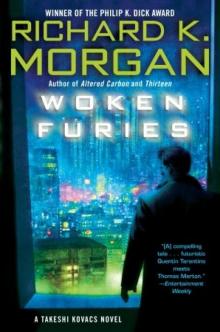 Woken Furies
Woken Furies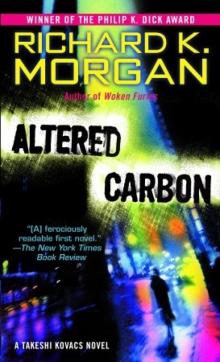 Altered Carbon
Altered Carbon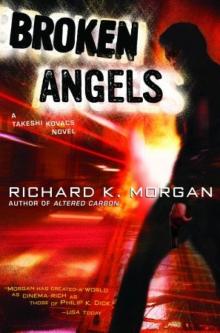 Broken Angels
Broken Angels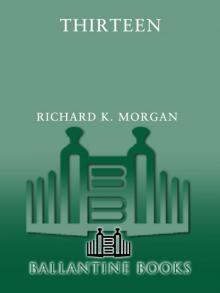 Thirteen
Thirteen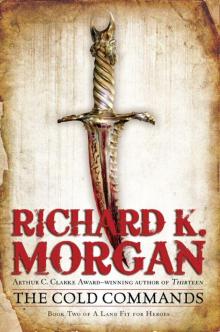 The Cold Commands
The Cold Commands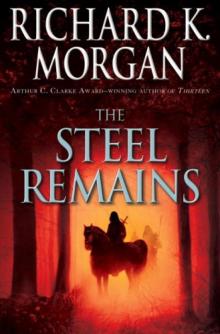 The Steel Remains lffh-1
The Steel Remains lffh-1 Market Forces
Market Forces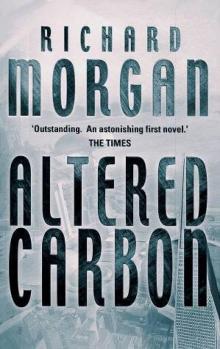 Altered Carbon tk-1
Altered Carbon tk-1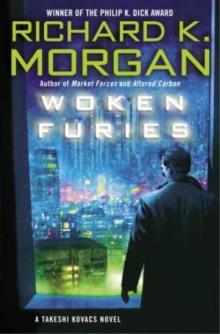 Woken Furies tk-3
Woken Furies tk-3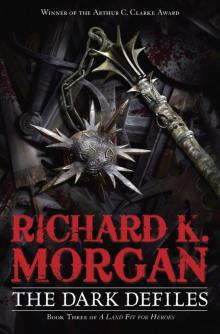 The Dark Defiles
The Dark Defiles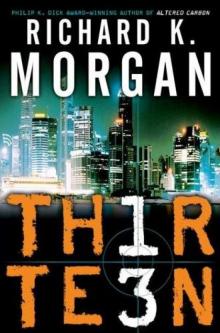 Black Man / Thirteen
Black Man / Thirteen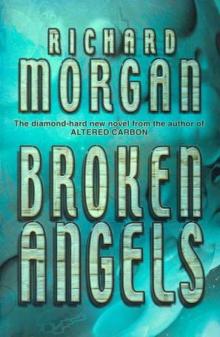 Broken Angels tk-2
Broken Angels tk-2